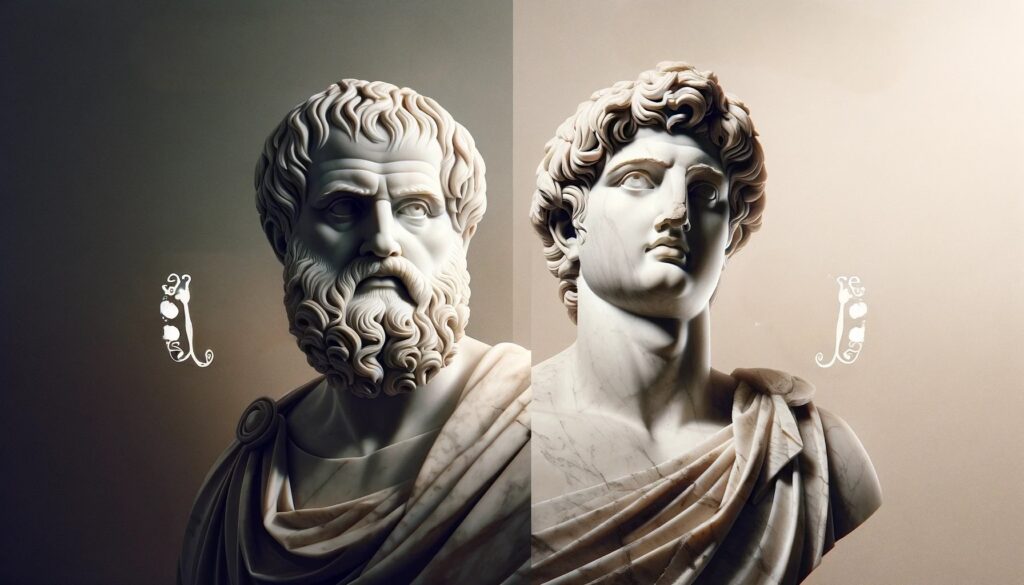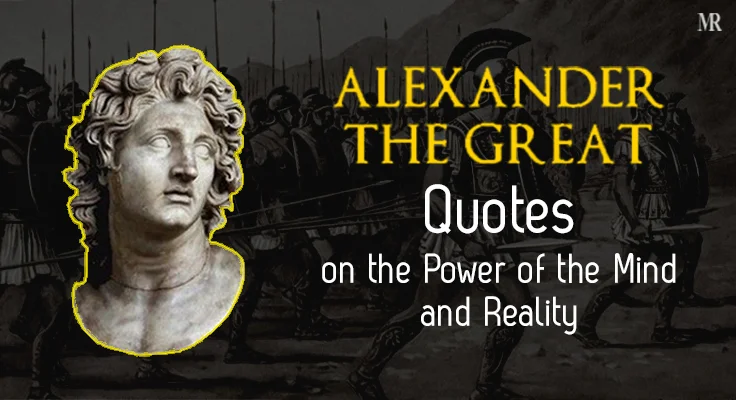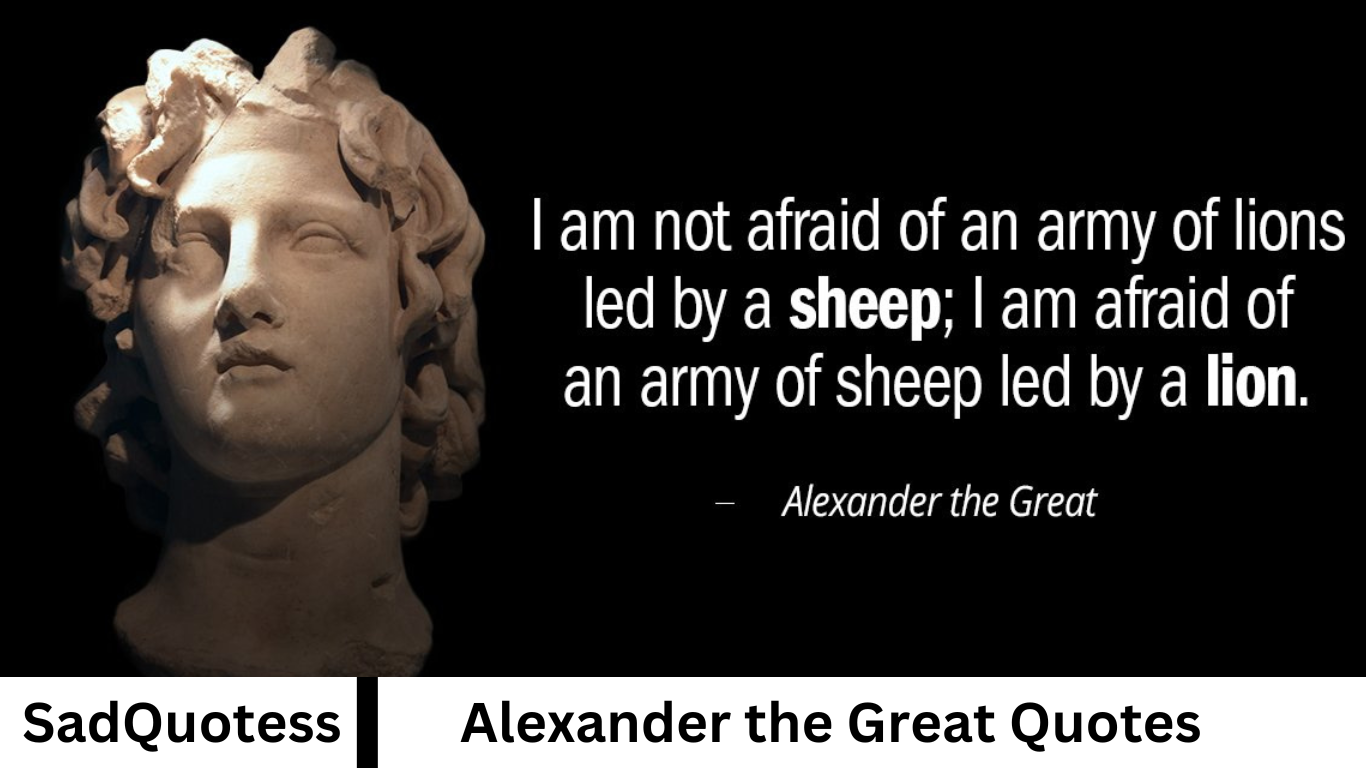Alexander the Great, one of history’s most unbelievable figures, abandoned a heritage that keeps on moving individuals right up to the present day. Brought into the world in 356 BCE in Pella, Macedonia, Alexander’s life was set apart by remarkable accomplishments, from his tactical triumphs to his philosophical thoughts.
His contemplations on life, passing, authority, and fate have been caught in different statements, a considerable lot of which mirror his complicated person and his perspectives on the world.
Alexander’s Views on Life
Alexander’s life was characterized by ambition, courage, and an unyielding desire to achieve greatness. He believed in the power of destiny, the importance of leadership, and the pursuit of knowledge. Below are some key aspects of his views on life, as reflected in his actions and recorded sayings:

- The Pursuit of Greatness: Alexander was deeply driven by the desire to surpass his father, King Philip II of Macedonia, and to create an empire that would stretch across continents. His famous quote, “I am not afraid of an army of lions led by a sheep; I am afraid of an army of sheep led by a lion,” reflects his belief in the power of strong leadership. He understood that true greatness lay not only in military strength but in the quality of leadership.
- The Power of Knowledge: Alexander was tutored by the philosopher Aristotle, and this education had a lasting impact on his views on life. He believed that knowledge was crucial to understanding the world. One of his famous quotes is, “I am indebted to my father for living but to my teacher for living well.” This reflects his appreciation for the intellectual foundation that guided his decisions and actions throughout his life.
- The Value of Courage: Alexander’s life was filled with battles and conquests, and he was known for his bravery. He led his troops into battle and was often at the front, showing his courage. He is quoted as saying, “I would rather live a short life of glory than a long one of obscurity.” This reflects his belief that life should be lived boldly and with purpose, even if it means facing significant risks.
- Leadership and Legacy: Alexander’s leadership style was often described as charismatic and visionary. He understood that to lead, one had to inspire and motivate others. He once said, “There is nothing impossible to him who will try.” This quote encapsulates his belief that determination and willpower could overcome any obstacle.
Alexander’s Views on Death
Death was an inevitable part of Alexander’s life, and his experiences and his philosophical education shaped his views on it. Despite his many conquests, Alexander faced death on the battlefield and knew that even he, the great conqueror, would eventually die.
- Acceptance of Mortality: Alexander’s acceptance of his mortality is evident in the way he lived his life. He was aware that his reign would not last forever, and he sought to make a lasting impact during his lifetime. One of his famous quotes about death is, “I am not afraid of death; I am afraid of not trying.” This reflects his belief that the pursuit of greatness was more important than the fear of death.
- Legacy Beyond Death: Alexander’s fear of death was not as much about the end of his life but about the potential fading of his legacy. He wanted to be remembered as a great leader and conqueror. “I would rather live a short life of glory than a long one of obscurity,” he famously said, underscoring his belief that a life well-lived should leave a lasting mark on history.
- The Death of His Beloved Friend Hephaestion: One of the most poignant moments in Alexander’s life was the death of his close companion and general, Hephaestion. Alexander’s grief was immense, and he ordered a lavish funeral for Hephaestion, even going so far as to deify him. This act shows that Alexander’s understanding of death was deeply personal, and he believed in the emotional and spiritual connections that bind individuals together beyond the grave.
- The Death of Alexander: When Alexander himself fell ill and eventually died in 323 BCE at the age of 32, the cause of his death remained a subject of speculation. His last words, “To the strongest,” were said to have been directed toward the generals vying for power after his passing. This reflects his belief in strength and leadership, even in the face of death. His death marked the end of an era, and his empire was soon divided among his generals, which led to the fragmentation of his conquests.
Alexander’s Legacy and Philosophical Influence
Alexander’s influence extended far beyond his military conquests. His interactions with different cultures, particularly during his campaigns in Persia, India, and Egypt, led to the spread of Hellenistic culture and ideas. He sought to merge Greek and Eastern cultures, and his reign marked the beginning of the Hellenistic Age, which profoundly impacted the development of Western civilization.

- Philosophy and the Spread of Greek Culture: Alexander’s education under Aristotle had a lasting effect on his worldview. He was a firm believer in the value of philosophy and the importance of cultural exchange. His conquests helped spread Greek philosophy, art, and science across the known world. He once said, “There is nothing impossible to him who will try.” This reflects his belief in the power of knowledge and determination to overcome challenges.
- Cultural Integration: Alexander’s efforts to integrate different cultures were revolutionary. He adopted Persian customs, married Persian women, and encouraged his soldiers to do the same. He believed that blending cultures would strengthen his empire. This approach was exemplified by his policy of founding cities, such as Alexandria in Egypt, which became centers of learning and cultural exchange.
- The Vision of Unity: Alexander’s vision of a united world was encapsulated in his idea of a cosmopolitan empire. He saw the world as a place where different cultures could coexist and thrive under the rule of a strong, enlightened leader. His famous quote, “I am the son of Zeus,” illustrates his belief in his divine destiny and his role as a unifier of the world.
On Leadership and Power

- “I am not afraid of an army of lions led by a sheep; I am afraid of an army of sheep led by a lion.”Meaning: This reflects Alexander’s belief in the importance of strong leadership. It suggests that the power of a leader can make or break the success of an army, regardless of its size or strength.
- “A king does not worry about the future; he creates it.”Meaning: Alexander emphasized the active role of leadership in shaping destiny. A True leader doesn’t wait for circumstances to dictate the future; they take charge and make things happen.
- “I would rather live a short life of glory than a long one of obscurity.”Meaning: This quote reveals Alexander’s prioritization of glory and achievement over a lengthy, unnoticed existence. He sought greatness above all else, even at the cost of a shorter life.
On Conquest and Ambition
- “There is nothing impossible to him who will try.”Meaning: Alexander believed that determination and effort were the keys to achieving any goal, no matter how challenging or unlikely it may seem.
- “I am not interested in the possible. I only believe in the impossible.”Meaning: This emphasizes Alexander’s refusal to accept limitations. He viewed obstacles as challenges to be overcome, fueling his boundless ambition to conquer vast lands.
- “There is nothing more important than conquering the world.”Meaning: Alexander’s singular focus on world domination drove his conquests. For him, no other goal was more significant than expanding his empire and achieving global influence.
On Courage and Bravery

- “In the end, we will remember not the words of our enemies but the silence of our friends.”Meaning: This quote highlights Alexander’s recognition of loyalty and courage. While enemies may challenge you, it is the support of friends and allies that ultimately defines your journey.
- “I am indebted to my father for living, but to my teacher for living well.”Meaning: Alexander acknowledged the significant influence of his mentors, notably Aristotle. This reflects his belief that true wisdom and guidance lead to not just survival but success in life.
- “How great are the dangers I face to win a good name in Athens.”Meaning: Here, Alexander reflects on the risks involved in achieving lasting glory and fame. He recognized the sacrifices required to earn a legacy worthy of the greatest cities and cultures of his time.
On Wisdom and Learning
- “I am not afraid of an army of lions led by a sheep; I am afraid of an army of sheep led by a lion.”Meaning: This quote exemplifies the significance Alexander placed on wisdom and the qualities of leadership. Knowledge and strategic thinking were more important than strength alone.
- “I would rather live a short life of glory than a long one of obscurity.”Meaning: Alexander’s education under Aristotle shaped his view of knowledge and wisdom as valuable tools for achieving greatness. His drive to learn was as powerful as his desire for conquest.
- “I am indebted to my father for living, but to my teacher for living well.”Meaning: This quote is a tribute to Alexander’s intellectual roots. It acknowledges the importance of education in shaping him not only as a king but as a thoughtful and wise ruler.
On Victory and Glory
- “A life spent making mistakes is not only more honorable but more useful than a life spent doing nothing.”Meaning: This quote reflects Alexander’s view that risk and trial are integral to progress. He believed in learning from failures and finding success through experience rather than avoiding mistakes.
- “Remember, the conduct of each depends on the fate of all.”Meaning: Alexander understood that the actions of every individual contribute to the collective outcome. Leadership, in his eyes, was about fostering unity and a shared sense of responsibility.
- “If I had to conquer the whole world again, I would choose my army from those who have served me.”Meaning: Alexander valued loyalty and dedication, recognizing the importance of having a trustworthy and capable army to achieve his goals.
On Vision and Legacy
- “I am not interested in the possible. I only believe in the impossible.”Meaning: This reflects Alexander’s visionary mindset. He didn’t see limits to what could be achieved, no matter how daunting or far-reaching his goals were.
- “There is nothing impossible to him who will try.”Meaning: that Alexander’s belief in human determination drove him to push boundaries. For him, persistence and effort could overcome any challenge or obstacle.
- “If I am not a king, I would rather be nothing.”Meaning: This quote reveals Alexander’s belief that his purpose and legacy were tied to leadership. Without the power and responsibility of kingship, he felt there would be little meaning to his life.
On Leadership and Sacrifice

- “He who is not a good servant will not be a good master.”Meaning: Alexander believed that to be a great ruler, one must first understand the value of service and humility. A leader should lead by example and serve those they command.
- “A king does not worry about the future; he creates it.”Meaning: As a leader, Alexander sought to shape the future through his actions, not merely react to it. His forward-thinking and proactive leadership were key to his success.
- “It is not the strongest of the species that survive, nor the most intelligent, but the one most responsive to change.”Meaning: Alexander believed that success in battle and leadership required adaptability. Those who could adapt to new situations and challenges were the ones who would survive and thrive.
On Perseverance and Determination
- “I would rather live a short life of glory than a long one of obscurity.”Meaning: This quote speaks to Alexander’s commitment to achieving greatness, even if it meant sacrificing longevity for fame and recognition.
- “I am not afraid of an army of lions led by a sheep; I am afraid of an army of sheep led by a lion.”This means that Alexander’s confidence in his leadership ability was paired with a deep understanding of the importance of perseverance. He valued the power of determined leadership over blind force.
- “There is nothing more important than conquering the world.”Meaning: Alexander’s single-minded determination to achieve his goals often led him to push beyond all limits. For him, personal glory and the creation of an empire were the most important pursuits.
On Loyalty and Brotherhood
- “There is nothing impossible to him who will try.”Meaning: Alexander’s relationship with his soldiers was one of mutual loyalty and shared ambition. This quote reflects his belief that nothing is out of reach when soldiers and leaders work together.
- “I would rather live a short life of glory than a long one of obscurity.”Meaning: The bonds between Alexander and his soldiers were built on shared sacrifices and dreams. His ambition for glory was intertwined with their loyalty and determination to succeed together.
Frequently Asked Questions
What did Alexander say regarding desire?
“There isn’t anything difficult to him who will attempt.”
This mirrors his limitless desire and confidence in conquering any deterrent through assurance.
What did he understand with respect to authority?
“I’m not scared of a multitude of lions driven by a sheep; I’m anxious about a multitude of sheep driven by a lion.”
Alexander esteemed solid initiative, realizing it could motivate others to significance.
How did Alexander see the information?
“I’m not keen on the body of a man, but rather the spirit of a man.”
He focused on scholarly and otherworldly development over actual strength.
What was his view on fellowship?
“There isn’t anything more significant than fellowship, for without it, life would be terrible.”
He saw unwaveringness and friendship as crucial to progress.
What did he say regarding brilliance?
“I would prefer to carry on with a short existence of magnificence than a long one of lack of definition.”
Alexander esteemed an existence of differentiation over the life span.
Conclusion
Alexander the Incomparable’s statements offer a brief look into the psyche of perhaps one of history’s most powerful figures. His considerations on initiative, aspiration, fellowship, information, and heritage mirror a man who was driven by a voracious longing for significance. Alexander’s way of thinking was tied to overcoming lands, molding the world through his activities, and leaving an enduring heritage. His words keep on rousing pioneers, masterminds, and visionaries across the globe, advising us that significance isn’t accomplished by some coincidence but by assurance, mental fortitude, and a determined quest for greatness.
